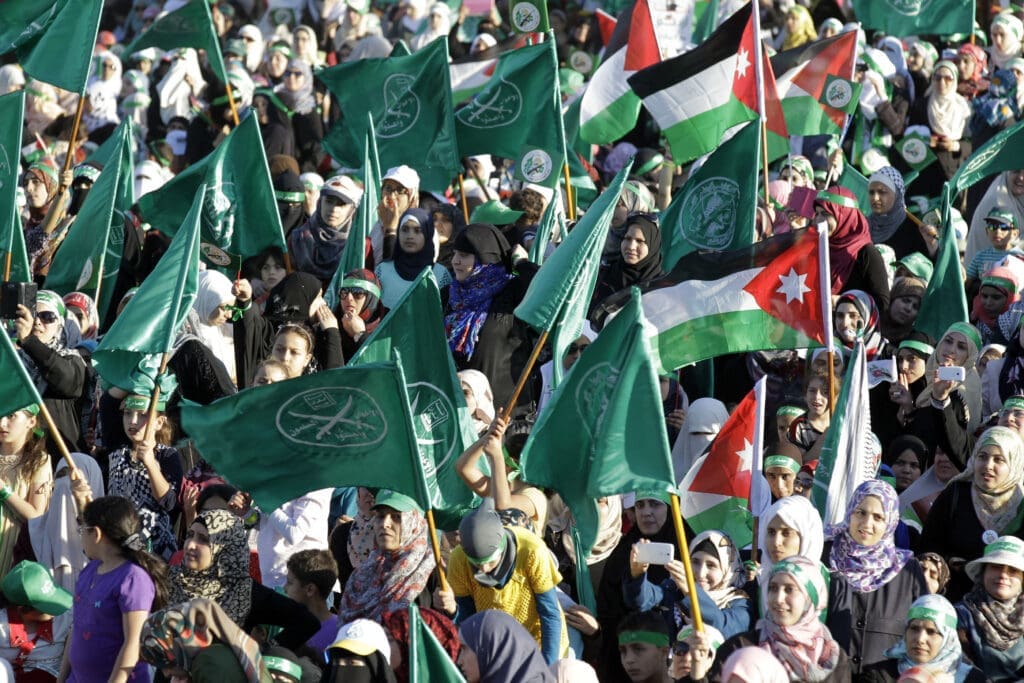At the end of April, on the heels of allegations that 16 members of the Muslim Brotherhood had taken part in a foiled domestic terror plot, the Jordanian government moved to officially outlaw the organization. The Hashemite monarchy and the Islamist opposition group have had a tempestuous relationship for decades, but this decision appears to mark the end of an era. While the fate of the 31 members of the Jordanian parliament affiliated with the Islamic Action Front (IAF)—the Brotherhood’s political wing—remains unclear, the decree represents a significant shift in relations between the government and the country’s largest opposition group.
Some have speculated that Amman’s decision was intended to curry favor with U.S. President Donald Trump ahead of an upcoming visit to the region, or to bolster regional stability for Israel’s sake. But it would be misguided to believe that this action will quiet domestic opposition. In non-democratic systems, allowing limited forms of opposition can serve as a release valve for popular frustration, enabling citizens to voice dissent without threatening the regime’s survival. By closing off one of the last sanctioned channels for dissent, the Jordanian government risks pushing opposition underground, making it more difficult for the government to manage.
The Jordanian monarchy has not always had such a contentious relationship with the Brotherhood. Originally founded in Egypt in 1928, with the Jordanian branch being established in 1945, the group’s socially conservative vision aligned with that of King Hussein I, who relied on his direct familial lineage to the prophet Muhammad to reinforce his legitimacy. By supporting the Brotherhood’s participation in Jordan’s political system, Hussein was able to bolster his religious credentials. When the kingdom was rocked by hostilities between the Jordanian Armed Forces and the Palestine Liberation Organization (PLO) in the early 1970s, the Muslim Brotherhood stood by the monarchy, preferring the stability and security of the government to the secular and socialist ideologies of the PLO. As the Brotherhood emphasized its loyalty to the Hashemites as the legitimate rulers of Jordan, both parties benefited from their partnership.
The relationship between the monarchy and the Brotherhood began to fray in the aftermath of the 1994 Israel-Jordan peace treaty, which the organization opposed. When Hussein’s successor, King Abdullah II, ascended to the throne at the turn of the century, the new king began to grow wary of the potential influence of political Islam, like many of his peers in the region. Abdullah thus sought to curtail the group’s activities in an effort to limit their sway in the country. Particularly after the Muslim Brotherhood ascended to power in Egypt following the 2011 revolution, the Jordanian government sought to curb the growing influence of the group.
Historically, Jordan has taken a more measured approach than Egypt, where President Abdel Fattah el-Sissi sought to dismantle the Brotherhood via both legal and violent means following his rise to power in 2013. Although Jordan officially dissolved the Brotherhood in 2020, the decision was loosely enforced. That was until last month, when the government promised to enforce the 2020 ban. While Jordan has not yet outlawed the Brotherhood’s political wing, as el-Sissi did in 2014, the shift in tone suggests that the kingdom may be embarking on a similar trajectory.
Channels of Dissent
Tensions between the Brotherhood and the Jordanian government came to a head following the events of October 7, 2023 in neighboring Israel-Palestine. The Brotherhood took a leading role in protests, which surged in the capital, taking particular aim at the Israeli embassy in Amman, where protestors demanded the suspension of energy agreements between the Jordanian and Israeli governments. By the time elections came around the next year, the IAF and other Brotherhood-affiliated candidates managed to secure nearly a third of all ballots cast, sending a strong message of resistance and Palestinian solidarity. Voting for Brotherhood-aligned candidates granted Jordanian citizens a valuable opportunity to voice their solidarity with the Palestinian cause.
Organizations like the Muslim Brotherhood serve an integral role in places like Jordan. In non-democratic contexts, institutions typically associated with democracies, such as political parties, legislatures and electoral systems, often serve to incorporate opposition forces. While ultimate decision-making power remains with the ruler, these structures provide sanctioned channels for actors with competing visions to express grievances and seek redress from within the system. When participants believe they have a fair chance of being heard, even if they do not achieve their preferred outcomes, they are less likely to resort to extralegal or disruptive tactics. Inclusion in the system encourages adherence to its rules; by granting opposition actors a platform to make demands, the regime incentivizes continued engagement through institutional means.
King Hussein understood this dynamic and strategically engaged the Muslim Brotherhood, pursuing a policy of co-optation that integrated the group into the political system while curbing its oppositional potential. By appointing Brotherhood leaders to influential positions in the education ministry, for example, Hussein enabled them to shape the national curriculum along religious lines. This inclusion served to neutralize the Brotherhood’s role as a political challenger, reducing their incentive to mobilize against the regime. The result was a period of relative cooperation between the monarchy and the Brotherhood. Their collaboration resulted in curricula that were imbued with Islamic undertones—an initiative that was also popular among parents at the time. In turn, the monarchy benefited from its association with the organization, enhancing its image as pious and religiously legitimate in the eyes of the public. Meanwhile, the Brotherhood was motivated to continue to play by the rules of the game to protect its influential status with the regime.
The Muslim Brotherhood’s relationship with the Jordanian monarchy became more confrontational beginning in the 1980s, however, driven largely by external regional developments. The Iranian Revolution and Afghan jihad inspired a broader Islamist shift toward political assertiveness and, in some cases, armed resistance. In the 2000s, growing frustration with Jordan’s peace treaty with Israel and subsequent economic cooperation further fueled the Brotherhood’s opposition. These factors pushed the organization away from its traditionally cooperative role toward a more critical stance vis-à-vis the monarchy.
While the organization is no longer allied with the regime, its role in recent decades as a sanctioned opposition group provided Jordanians with an institutional channel to express dissent, particularly for those critical of the government’s relationship with Israel. Protest, in this context, served a dual function: it allowed citizens to voice opposition while also providing the government with valuable information about public sentiment. The decision to outlaw the Brotherhood has undermined this function.
When opposition is driven underground, it becomes less visible and more difficult for the state to monitor or manage. This already appears to have been unfolding in Jordan, where some individuals affiliated with the Brotherhood have allegedly turned to illicit means to pursue their political aims. Even before April’s decree, the Brotherhood operated in a legal gray area following its 2020 ban. But the current escalation is difficult to imagine without years of growing estrangement between the organization and the government. As the Brotherhood is pushed further to the political margins, there is a real risk that its tactics will become more militant.
Egypt offers a cautionary parallel: although the regime’s attempt to eradicate the Brotherhood did not lead to a significant violent counter-response, the state has incurred enormous costs, both financial and reputational, to suppress and contain the group. Moreover, increased repression can sometimes achieve outcomes contrary to the government’s aims, reinforcing Islamists’ narratives of persecution, making it easier to justify their cause and attract new recruits. Jordan may now be entering a similar cycle.
By banning the Muslim Brotherhood, the space available for political participation in Jordan has shrunk. This decision makes it more difficult for those with criticisms of the government to participate in politics. In this new environment, those seeking to express dissent are left with few sanctioned avenues and may be driven to increasingly radical forms of protest. As Israel’s assault on Gaza continues, public frustration in Jordan is likely to intensify. Without a legitimate outlet for that frustration, Jordanians may start to feel alienated from participatory politics. The government must therefore reconsider how it engages with dissent, or it could face mounting unrest.


